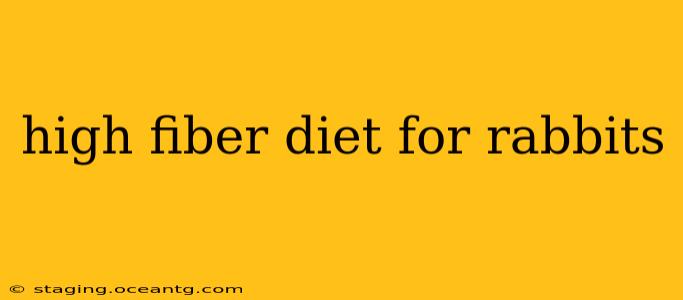Rabbits are herbivores with digestive systems uniquely adapted to a high-fiber diet. Providing your bunny with the right kind of fiber is crucial for their health and wellbeing, preventing serious digestive issues like hairballs, bloat, and dental problems. This comprehensive guide will explore the importance of a high-fiber diet for rabbits, answer frequently asked questions, and offer practical advice for ensuring your furry friend thrives.
What is the Importance of a High-Fiber Diet for Rabbits?
A high-fiber diet is paramount for rabbit health. Fiber, primarily found in hay, stimulates gut motility, preventing stasis (slowed movement of food through the digestive tract) which can lead to serious complications. The constant chewing also helps wear down their ever-growing teeth, preventing painful overgrowth. Insufficient fiber intake can result in a variety of health problems, including:
- Gastrointestinal Stasis (GIS): This is a life-threatening condition where the digestive system slows or stops.
- Dental problems: Overgrown teeth can make eating painful and lead to infection.
- Obesity: A lack of fiber can lead to weight gain and associated health problems.
- Hairballs: Fiber helps move hair through the digestive system, preventing dangerous build-ups.
What Kind of Hay is Best for My Rabbit?
Hay should constitute the bulk (80-90%) of your rabbit's diet. The best types of hay are:
- Timothy hay: This is generally considered the best option for adult rabbits, offering a good balance of nutrients and fiber.
- Orchard grass: Another excellent choice, particularly for adult rabbits, providing high fiber content.
- Grass hay (rye, oat, brome): These hays are also good options, but can be higher in sugar than Timothy or Orchard grass. Use in moderation, especially for overweight or prone-to-GI-issues rabbits.
Avoid alfalfa hay, especially for adult rabbits, as it's high in calories and calcium and can contribute to obesity and urinary problems.
What Other Foods Can I Give My Rabbit?
While hay forms the cornerstone of a rabbit's diet, you can supplement with small quantities of fresh vegetables and fruits, and a limited amount of commercial rabbit pellets.
- Vegetables: Dark leafy greens like romaine lettuce (in moderation), kale, parsley, spinach (in limited quantities), bell peppers, and carrots (in small amounts) provide additional nutrients. Always introduce new vegetables gradually to avoid digestive upset.
- Fruits: Offer small amounts of fruits like strawberries, blueberries, or raspberries as occasional treats. These are high in sugar and should be given sparingly.
- Pellets: Choose high-fiber, low-sugar pellets. These should only make up a small percentage (5-10%) of your rabbit's total daily food intake.
How Much Hay Should My Rabbit Eat?
A good rule of thumb is to provide unlimited access to hay. Your rabbit should always have a full hay rack or feeder available. The amount they consume will vary depending on their size, age, and activity level, but they should be constantly nibbling.
What are the Signs of a Rabbit With Digestive Problems?
If you notice any of the following signs, consult your veterinarian immediately as they could indicate a serious digestive problem:
- Lack of appetite: A significant decrease in food intake.
- Decreased or absent droppings: Fewer droppings or completely absent droppings.
- Soft or watery droppings: Changes in the consistency of droppings.
- Lethargy: Your rabbit seems unusually quiet or inactive.
- Swollen belly: Abdominal distention.
- Straining to urinate or defecate: Difficulty eliminating waste.
How Can I Introduce a High-Fiber Diet Gradually?
Sudden dietary changes can upset a rabbit's sensitive digestive system. If switching to a new type of hay or introducing new foods, do so gradually over several days to a week. Mix the new food with the old food, gradually increasing the proportion of the new food.
Can Too Much Fiber Be Harmful to My Rabbit?
While a high-fiber diet is essential, excessive fiber can also cause problems. This is rare, but ensure your rabbit always has access to fresh water to help the digestive system function properly.
By following these guidelines and providing your rabbit with a diet rich in high-quality hay, supplemented with appropriate fresh foods and a small amount of pellets, you can ensure their digestive health and overall wellbeing. Remember to consult with a veterinarian experienced in rabbit care for any concerns about your rabbit's diet or health. Their expertise can help you create a tailored feeding plan to meet your individual rabbit’s needs.
